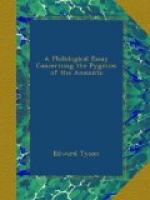Aristotle,[A] ’tis true, tells us, [Greek: Holos de ta men agria agriotera en tae Asia, andreiotera de panta ta en taei Europaei, polymorphotata de ta en taei libyaei; kai legetai de tis paroimia, hoti aei pherei ti libyae kainon;] i.e. That generally the Beasts are wilder in Asia, stronger in Europe, and of greater variety of shapes in Africa; for as the Proverb saith, Africa always produces something new. Pliny[B] indeed ascribes it to the Heat of the Climate, Animalium, Hominumque effigies monstriferas, circa extremitates ejus gigni, minime mirum, artifici ad formanda Corpora, effigiesque caelandas mobilitate ignea. But Nature never formed a whole Species of Monsters; and ’tis not the heat of the Country, but the warm and fertile Imagination of these Historians, that has been more productive of them, than Africa it self; as will farther appear by what I shall produce out of them, and particularly from the Relation that Ctesias makes of the Pygmies.
[Footnote A: Aristotle Hist. Animal, lib. 8. cap. 28.]
[Footnote B: Plin. Nat. Hist. lib. 6. cap. 30. p.m. 741.]
I am the more willing to instance in Ctesias, because he tells his Story roundly; he no ways minces it; his Invention is strong and fruitful; and that you may not in the least mistrust him, he pawns his word, that all that he writes, is certainly true: And so successful he has been, how Romantick soever his Stories may appear, that they have been handed down to us by a great many other Authors, and of Note too; tho’ some at the same time have looked upon them as mere Fables. So that for the present, till I am better informed, and I am not over curious in it, I shall make Ctesias, and the other Indian Historians, the Inventors of the extravagant Relations we at present have of the Pygmies, and not old Homer. He calls them, ’tis true, from something of Resemblance of their shape, [Greek: andres]: But these Historians make them to speak the Indian Language; to use the same Laws; and to be so considerable a Nation, and so valiant, as that the King of India makes choice of them for his Corps de Guards; which utterly spoils Homer’s Simile, in making them so little, as only to fight Cranes.
Ctesias’s Account therefore of the Pygmies (as I find it in Photius’s Bibliotheca,[A] and at the latter end of some Editions of Herodotus) is this:
[Footnote A: Photij. Bibliothec. Cod. 72. p.m. 145.]




